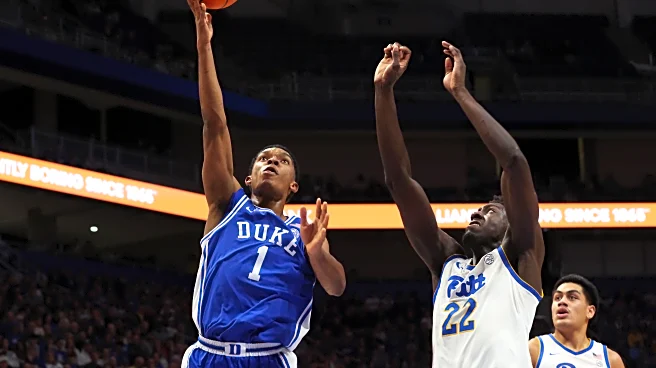What's Happening?
The Boston Red Sox have clinched a playoff spot for the first time since 2021, following a significant roster change that involved trading superstar Rafael Devers to the Giants. The trade, executed by Craig Breslow, was initially met with skepticism but ultimately contributed to the team's success. Since the trade, the Red Sox have achieved a 51-36 record, demonstrating the effectiveness of their revamped roster. Rookie Roman Anthony was added to the lineup shortly before Devers' departure, and the team has since shown improved functionality and resilience. The Red Sox secured their postseason berth with a walk-off triple by Ceddanne Rafaela against the Tigers.
Why It's Important?
The Red Sox's ability to clinch a playoff spot despite trading a key player like Rafael Devers highlights the team's adaptability and strategic management. This development is significant for the franchise, as it showcases their capacity to overcome internal challenges and maintain competitive performance. The decision to trade Devers, a franchise cornerstone, was risky but ultimately paid off, allowing the team to focus on a dynamic style of play and utilize their roster more effectively. The success of the Red Sox could influence other teams to consider bold roster changes to enhance performance.
What's Next?
As the Red Sox prepare for the postseason, they will need to continue leveraging their roster's strengths and maintain the resilience that has brought them this far. The team will face challenges in the playoffs, especially with the absence of key players like Roman Anthony due to injury. The management's decisions during the postseason will be crucial in determining the team's success. The Red Sox's performance could set a precedent for future roster strategies in Major League Baseball.
Beyond the Headlines
The trade of Rafael Devers and the subsequent playoff berth for the Red Sox raises questions about the identity and dynamics of sports teams. It challenges the notion that a team's success is solely dependent on its star players, emphasizing the importance of strategic management and team cohesion. This development could lead to a shift in how teams approach player trades and roster management, focusing more on overall team functionality rather than individual talent.









